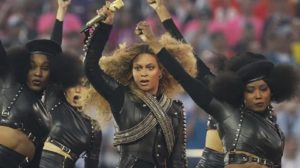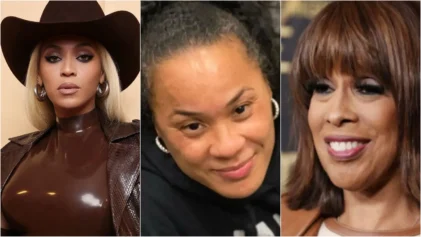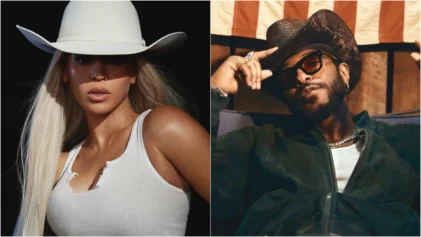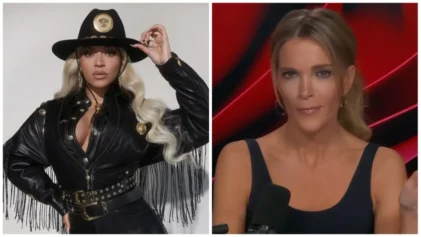Apparently, white self-righteous indignation over unfiltered, authentic expressions of Black suffering is the preferred outrage du jour. When Black people protest the conditions under which they live, or call out white supremacy, white folks get bent out of shape and rail against the protest itself, rather than condemn the actual racial oppression that we are fighting against. This occurs as white guilt is unacknowledged and also as blatant forms of racism are ignored or even glorified.
A case in point is the recent flap over Beyoncé and her Super Bowl performance of her new song, “Formation.” Flanked by an army of Afro-wearing, Black Panther-inspired sisters dressed in black berets and black outfits, one almost had the impression that the halftime show somehow got through the network censors. We are not used to seeing such Black political expression from Beyoncé, and certainly not during the Super Bowl halftime show, the most widely watched, commercialized, all-American performance space in mainstream media in any given year.
In “Formation,” Beyoncé gave a nod to #BlackLivesMatter and the movement against police brutality, incorporated themes of post-Hurricane Katrina and the suffering of Black residents of New Orleans, and even gave a shout out to the “bamas” out there. Like “Hell You Talmbout” and “Ain’t No Stoppin Us Now,” her song may very well become a new Black protest anthem, a “Lift Every Voice and Sing” for a new generation, at a time when we sorely need one.
Beyoncés dancers in black berets at #SB50 paying homage to the Black Panthers 50 years after their #formation in ’66 pic.twitter.com/YXpzBkkm6s
— The Dream Defenders (@Dreamdefenders) February 8, 2016
And some white folks have lost their minds ever since this past Sunday. “How can she do that?” they ask. They know what the political awakening of Beyoncé Knowles portends for the greater Black community and its emerging social, cultural and political consciousness. And like the Black Lives matter movement, it means more Black folks calling out white racism, which leads to more shedding of white tears and outrage over “Black racism,” an imaginary concept in a white supremacist world. Never mind the racial injustice, the police brutality and deprivation the real Black Panther Party fought against in the 1960s. By condemning the concept of the Black Panthers — or Black Lives Matter, or any convenient whipping boy — and everything they represent at face value, whites attempt to change the subject by attacking the messenger.
The white feigned outrage over Beyoncé – or at best, a real but misdirected and illegitimate outrage — reflects a larger issue. White society does not want to be reminded about what they do and get away with on a daily basis, and what they have done for 400 years in this country. And yet, there is no outrage, no commotion as hardcore racist and presidential candidate Donald Trump makes racially offensive statements on a regular basis. Rather, Trump grows in popularity as his white supremacist sentiments are embraced by the mainstream media and the general public.
There is a pathological denial of the overarching role of white-skin privilege and white supremacy in making America what it is. Not only is there a refusal to come to terms with a history of oppression that represents a continuum into the present day, there is also an attempt to rewrite history.
So, the kidnapping and forced labor of millions of Black people, the genocide and mass rape and theft of a people, is suddenly recast and rebranded as Black folks coming to America as immigrant labor — for their own benefit no less. The Civil War gets a makeover, presented as a conflict over states’ rights that had nothing to do with slavery. Meanwhile, Black history seldom is taught, presented as a footnote and on the sidelines when it does come into play.
As the Washington Post recently reported, a school district in Virginia has banned an educational video about racial inequality after some parents called its message racially divisive. The video, “Structural Discrimination: The Unequal Opportunity Race,” was shown to students last week at Glen Allen High School in Henrico County as part of Black History Month. The ingenious four-minute video portrays the history of white privilege and institutional discrimination against Black people by way of a race track. White runners and runners of color compete on the track, as Black and Brown runners are stopped along the way by various obstacles — discrimination, racial profiling, poor schools, prison, or other factors. Meanwhile, white runners are constantly ahead of the game, as they get older on the track and pass the baton — an ever-growing bag of money to the successive generation of white runners. This is what the inheritance of white wealth through privilege and institutional racism, at the expense of Black people, is all about.
“The video is designed for the general public,” said Luke Harris, co-founder of the African American Policy Forum, which produced the video. “We produced something you could show in elementary and secondary schools or in college studies courses.”
Harris, who is also an associate professor of political science at Vassar College, added: “We found that the video has a huge impact on the people that we’re showing it to. Most of us know very little about the social history of the United States and its contemporary impact. It was designed as a tool to throw light on American history.”
However, some white parents dismissed the video as “racially divisive” and a “white guilt video.”
White America believes the problem arises when Black people discuss racism and make whites feel uncomfortable. In actuality, the real culprit is white America and its refusal to own up to its racism. Feeling awkward is the least that white folks should experience.
It is only through confronting a legacy of crimes that were committed over generations — and continue to take place — that the country can heal. Black people merely raising the issue and telling you how we feel about that does not bring the pain. The pain was there, and had been for some time. Some simply decided to ignore it, if they even knew it existed.



